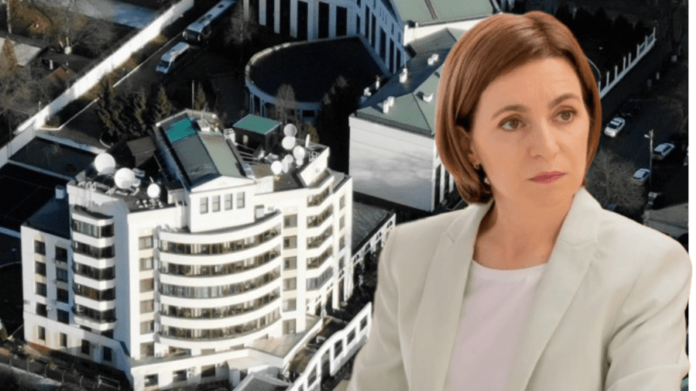The Russian Embassy in Chisinau was equipped with antenna systems capable of receiving any type of long-range signal. There are about 28 such devices on the roofs of two buildings of the diplomatic mission on Stefan cel Mare Avenue.
This is almost twice as much as in Brussels, where many European Union units and NATO headquarters are located. According to experts, such equipment can collect confidential information about the country’s security, jurnal.md reports.
On May 14, 2023, at approximately 1:30 pm, while most of the city’s residents were enjoying their weekend at their country retreats, a balding man made his way to the rooftop of a residential building within the premises of the Russian embassy in Chisinau. With a vigilant look around, he proceeded to set up and manipulate transmitting parabolic antennas, and carefully handle the connecting cables. This man was identified as Pavel Yakunin, originally from Ryazan. Before his service in the GRU, he had completed his studies at the Cherepovets Military Institute of Radio Electronics. Within the embassy, Yakunin holds a discreet role as an officer in the military attaché system, and only a select few are aware that he is responsible for overseeing the secret communication channels connected to GRU headquarters in Moscow and the reception center for space intelligence in Vatutinki, near Moscow.
The motive behind Yakunin’s rooftop visit on that particular Sunday remains a matter of speculation. It is conceivable that it could be linked to the upcoming EPC Summit and the recent cyber-attack on the internet resources of Moldova’s President’s administration, government, Ministry of Foreign Affairs, and the Information Technology and Cybersecurity Service (STISC). This breach resulted in the leakage of a substantial amount of classified correspondence involving high-ranking officials and certain law enforcement agencies, as well as other critical information. Additionally, on the same day, the Gagauzia region was holding elections for its head, and GRU supervisors were eagerly awaiting updates from their agents through a secure communication line. After spending about an hour on the rooftop, Yakunin discreetly disappeared back into the confines of the embassy.
As Moldovan journalists found out, the territory of the diplomatic mission in Moldova is far ahead of the Belgian capital on the list of Russian priorities in terms of surveillance systems.
“I counted at least 28 antennas installed on these two buildings. And that’s just what you can see with the naked eye. Most of them, 13, are parabolic antennas. This is high-frequency equipment connected to special equipment. According to experts, the system is capable of intercepting telephone conversations, Wi-Fi data, and conversations over long distances. And all these technologies are connected near the main state institutions,” correspondent Calin Zhukovsky said.
Whether antennas can be used in the military domain, experts answer that they only act as conductors. The equipment to which information is transmitted and received is located in buildings, and, theoretically, all signals, starting with radio-television signals, mobile networks, satellite communications, and the Internet, can be intercepted, says Oleg Paduraru, an information technology expert.
The reaction of the President of Moldova Maia Sandu
“Our services know this information. At the right time, he will come with details and solutions for this problem”. This is how the president reacted, being asked by journalists if he knew anything about the spy center.
Before the investigation appeared, the subject of the antennas at the headquarters of the Russian embassy in Chisinau was not discussed in public space, and the authorities didn’t communicate about this problem and alleged interception methods used by Russian espionage.
The Russian Ambassador to Moldova was summoned to the MFAEI to clarify the situation regarding the antennas installed in the embassy.
“Depending on the further development of events, the authorities of the Republic of Moldova will analyze several options for responding. We consider unacceptable any actions of espionage and foreign interference in the internal affairs of the Republic of Moldova.”


